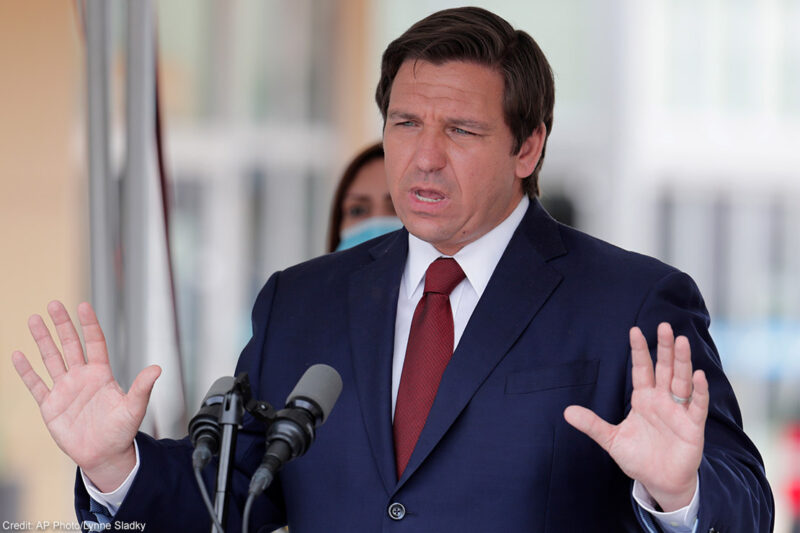When will DeSantis listen to his own voters on ex-felons' voting rights?


On Sept. 11, Gov. Ron DeSantis and state Republican leaders won their legal battle to disenfranchise hundreds of thousands of people with prior felony convictions. The U.S. Court of Appeals for the 11th Circuit embraced Republican politicians' specious arguments that ex-felons should be required to pay all fines and fees before voting.
This decision dealt a blow to Floridians who care about racial justice and basic principles of democracy. The ruling also spited an unlikely and less discussed constituency: Republican voters.
This story starts in 2018, when DeSantis and Republican politicians campaigned against Amendment 4. The ballot measure abolished the permanent disenfranchisement of people convicted of most felonies. to be a “tough on crime” governor, DeSantis opposed the initiative.
Republican voters disagreed with him. Before Election Day, after showed a clear majority of Florida Republicans supported Amendment 4. Support among Florida Republicans climbed to .
These numbers were not outliers. Nationally, of people who voted for Donald Trump in 2016 support restoration of ex-felons' voting rights.
On Election Day, the Sunshine State’s Democratic hubs turned out in force for the measure. So did the state’s most Republican regions. Amendment 4 won in 61 of Florida’s 67 counties. Conservatives, from the ruby-red Panhandle to the sea-green suburbs of Sarasota, voted for the measure.
Consider election results from individual counties. Voters in Gadsden and Broward counties, where Hillary Clinton received more than 65% of votes in 2016, supported Amendment 4. But so did a majority of voters in Dixie County, where Donald Trump garnered over 80% of votes in 2016. As did a majority of voters in Calhoun, Liberty, Walton and Washington counties, where Donald Trump earned more than 75% of votes cast in 2016.
In an era of rancorous politics, this resounding, bipartisan consensus over voting rights might seem unexpected. But attentive observers of Florida politics weren’t surprised.
The political strategists and grassroots activists behind Amendment 4 built an inclusive campaign that directly appealed to conservatives. Desmond Meade, a civil rights activist who spearheaded the campaign for Amendment 4, recruited a Republican staffer named Neil Volz to be the effort’s political director.
They enlisted Christian conservatives, who voters that “redemption and second chances” were at the “heart of the Christian faith.” They recruited business executives who discussed the economic harms of permanent disenfranchisement and mass incarceration. They accepted support from liberal billionaire George Soros — but also from the archconservative Koch brothers and the religious right.
Together, this motley alliance ‚Äî of the ¿œ∞ƒ√≈ø™Ω±Ω·π˚ and the Christian Coalition, of libertarians and labor unions ‚Äî won. And won big. A supermajority of Floridians supported Amendment 4, which amassed 1,072,740 more votes than DeSantis received on the same ballot.
Even before assuming office, DeSantis and his allies began plotting to undermine the will of Florida voters and, importantly, the will of Republican voters. They devised a scheme that conditioned ex-felons' rights restoration on how much money they have. This “pay-to-vote system,” according to Judge Robert Hinkle of the Northern District of Florida, to a modern-day poll tax.
Fast forward to Sept. 11, when the 11th Circuit sustained this poll tax. Commentators were quick to depict the ruling as a win for Republicans. In reality, the decision was a win for Republican party elites and a loss for voters of all partisan affiliations.
Sadly, this is not the first time that Republican party elites have ignored the wishes of regular Republican voters. A majority of Florida Republicans the state to expand Medicaid under the Affordable Care Act. DeSantis refuses. of Florida Republicans are concerned about climate change. DeSantis a “D” from the Sierra Club for his climate-change record. Blocking voting-rights restoration is just the latest episode of Republican leaders pandering to the far-right fringes and special interests at the expense of the majority of Republican voters.
It’s easy to look at this episode and get cynical about American politics. But that would be the wrong lesson to take from the Amendment 4 saga. At a time of bitter, partisan division, a supermajority of ordinary Democrats and Republicans joined forces to pass the most significant expansion of voting rights since 1965. Even if DeSantis scored a pyrrhic victory before the 11th Circuit, he can’t hold back this broad, bipartisan coalition forever.
This op-ed was originally published in the .



